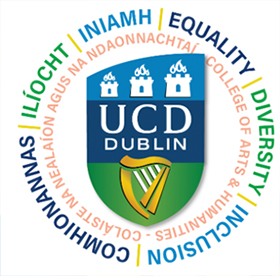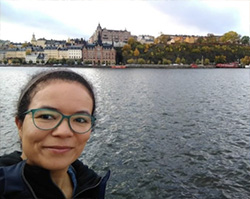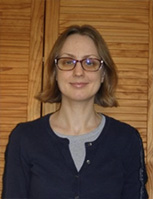 Racialisation and Decoloniality
Racialisation and Decoloniality
Teaching and Learning
In the wake of the increasing calls from students to decolonise and diversify the curriculum and university, efforts are being made across the College to provide students with opportunities to engage with the concepts of race and decoloniality in the classroom. The School of English, Drama and Film is conducting ongoing work both within the School and in conjunction with colleagues in other Schools and involves lecturers, tutors and students. Those involved include Sharae Deckard, Treasa De Loughry, Jorie Lagerwey and Emma Penny – as a postgraduate student and teaching colleague, Emma Penny’s work foregrounded the importance of class in relation to pedagogy and research, raising the issue of its underrepresentation at the level of curriculum, critical analysis and university policy.
Sharae Deckard’s teaching and research conjoins three areas: postcolonial and world literature; environmental humanities; and critical theory. Pedagogy in developing new modules is motivated by intersecting aims: to decolonize the curriculum and increase familiarity with the aesthetics and genres of world literature; to instil knowledge of key theoretical frameworks of postcolonial, world-literary and eco-materialist criticism; to develop critical literacy around ideologies of class, gender, race, and ‘nature’ and address the urgent challenge of climate change. She collaborated with Jeanne Riou (SLCL) to teach world-systems theory on her MA module Intro to Cultural Theory and has coordinated Queer Frictions on UCD’s MA in Gender, Sexuality and Culture, where she taught a unit on postcolonial queer fiction. A new MA degree in Environmental Humanities is currently being designed, commencing in autumn 2021.
Sharae Deckard also designed and developed the module ‘Reading World Literature’, a first-year co-taught core module that commenced in autumn 2020. It focuses on how literature grapples with world-spanning phenomena such as slavery, empire, resource imperialism, decolonization, and capitalist globalization, and features literary texts by writers of colour from colonies and post-colonies across the Global South, including the Caribbean, Latin America, Africa, and South Asia. This module is core for all students who have an English subject as part of their degree pathway; at our highest registration this term we had 392 students enrolled.
‘Global Eco-Literature’ was also introduced and developed by Sharae Deckard and is currently coordinated by Treasa De Loughry. This third-year course focuses on representations of climate change and environmental crisis in the contemporary world and postcolonial literature from multiple geographies, including South Asia, the Pacific, and Canada, and highlights in particular the intersection of imperial and neo-imperial legacies of exploitation with environmental racism and socio-economic inequalities and the ways in which these act to compound the ‘slow violence’ of environmental crisis and climate change. More broadly, Treasa De Loughry lectures on postcolonial and world literary studies, and the environmental humanities, with particular expertise in postcolonial ecocriticism, the global novel, and new international short stories, and diasporic authors. She has a particular interest in decolonial, anti-colonial, and anti-racism discussions and curricular reform.
Jorie Lagerwey organised a School workshop on Decolonising the Curriculum, which brought together students and teaching staff with an interest in diversifying the curriculum. The student-led discussion served to support and progress plans for specific changes.
Concepts of race and ethnicity are also crucial to Maria Stuart’s teaching in American literature and crime fiction. Nerys Williams too has always tried to open up text and curricula so that they are more representative of culture, race, class and ethnicity. She teaches diverse textual experiments in tandem with manifestos and key statements on race, identity and politics. At MA level she teaches ‘American Lyric: Document and Memoir 2019-20’, including Claudia Rankine’s ‘Don’t Let me be Lonely’ and her political/poetics work on racial theory in The Racial Imaginary, Yusef Komunyakaa’s work on Black veteran experience in Vietnam poetry Dien Cai Da, and The 13th, a documentary on US Prison System read in conjunction with CD Wright’s documentary poems One Big Self/collaboration with photographer Deborah Luster (also about the prison system).
In the School of Music, Jaime Jones continues her work in decolonising the curriculum. Building on her own teaching practice in modules like ‘Popular Music Ethnography’ and ‘Musics of the World’, she advocates an approach that goes beyond the representation of diversity to also challenge methodologies and epistemologies that are founded upon white privilege.
The stage one Music, Film and Drama module ‘Adaptation, Transmediality and Intertextuality’, which is co-taught by Wolfgang Marx (Music), Catherine Casey, and Harvey O’Brien (both SEDF), broadened the scope of case studies centred on Romeo and Juliet beyond Europe to consider an Iraqi production and a Bollywood film version. 'Several classes in the module Music History since 1750 used the work of contemporary anti-racist musicians to spur examination of the role of racism in earlier music history. The module also included critical consideration of processes of canon formation.'
In the School of Languages Cultures and Linguistics, Joseph Twist’s modules ‘Transcultural Encounters 1 and 2’ (the former being taught by Britta C. Jung this year) focus on marginalised and racialised perspectives in contemporary German culture. In these modules, students are encouraged to question Eurocentric perspectives by engaging with the creative and scholarly writing of ethnic minorities that call traditional notions of belonging into question.
Annette Clancy (SAHCP) restructured her ‘Business 1 (management)’ for the MA in Cultural Policy and Arts Management to recognise the history of management practice in colonisation. She’s included C Rosenthal’s Accounting for Slavery: Masters and Management (2018) as a key reading
Two history modules, ‘Slavery and the New World’ and ‘History of the British Atlantic’ offered by Marc Caball, enabled students to explore the legacies of European colonialism, including ethnic and cultural discrimination, sexual violence, colonial dispossession and slavery. This learning experience has been expanded with the introduction of a Level 1 survey of ‘American History from 1776-1991’, coordinated by Sandra Scanlon, that focuses on the construction of race and the influence of white supremacy on US political, social, economic and cultural developments. Through these modules at different levels of the syllabus and at different stages of students’ pedagogical experience, the School of History is building on our commitment to foreground EDI in history through our teaching.
Research
In the School of History, there has been a particular focus on teaching and researching the history of slavery. The MA in Archives and Records Management explored changes to archival practice in response to the Universities Studying Slavery initiative in the United States. This consortium is a multi-institutional collaboration ‘focused in sharing best practices and guiding principles about truth-telling projects addressing human bondage and racism in institutional histories’. Two of our students, Ashely Williams and Emily Jennings engaged with the initiative. Ashley Williams interviewed archivists in repositories in the States at a time that coincided with the Black Lives Matter Protests. Emily Jennings looked at the George Padmore archive in the UK, which is a black activist archive, and explored the idea of how it relates to affect and post-truth. She again did a case study which thought about how archival approaches change to accommodate EDI issues.
 |
 |
| Ashley Williams (MA Archives Records Management) |
Emily Jennings (MA Archives Records Management) |
In English, Drama and Film, Nerys Williams is currently researching a chapter (as part of a monograph) on Langston Hughes’s engagement with BBC radio particularly his coediting of the series ‘The Negro in America’ (1964) with D.G. Bridson. She is evaluating listening reports as a way of reading how the audience listened to race, arguing that reception of Hughes’s work (and some of the preconceptions of the audience) informs us of how Caribbean migration was also presented in the UK. Treasa De Loughry’s research is on world literature and world-ecology, examining cultural representations of waste, toxicity, and eco-modernisation, and related issues of inequality, social and ecological justice, labour, gender, and race in relation to sites across the global south with a focus on West Africa and South Asia.
Kathleen James-Chakraborty (SAHCP) has received a grant in collaboration with Bryan Clark Green from the Global Architectural History and Theory Teaching Collaborative’s (GAHTC) Anti-Racism and Global Architectural History special call. The GAHTC is hosted at MIT and funded by the Andrew Mellon Foundation to prepare a lecture on the Belgian Friendship Building at Virginia Union University, which was posted on their site in September. For more information see (opens in a new window)here. She also presented the lecture via zoom in October 2020 to a seminar on architectural research sponsored by Queen’s University Belfast. She has also published on core EDI matters for the Moore Institute and subsequently the Society of Architectural Historians: (opens in a new window)Monuments Matter and she is the author a related piece published in 2019 by (opens in a new window)English Language Notes.
Outreach, Impact and Service
This emphasis on questions of race and decoloniality also informs a great deal of outreach work done in the College. Anne Mulhall’s (SEDF) work as a whole is informed by cross-community, multi-disciplinary energies and a desire for effects outside of academic spheres. She has been involved with grassroots migrant justice organising in Ireland for many years, particularly with the (opens in a new window)Anti-Racism Network and with (opens in a new window)MASI Movement of Asylum Seekers in Ireland. As a member of MASI’s Board of Directors, she looks forward to facilitating further collaboration between UCD and MASI with a view to real inclusion of and access to education for people with experience of Direct Provision, and with doing what she can to build the broad-based movement to end Direct Provision. Her collaborative projects include the ‘Right To Work’ job skills workshop (March 2019) for jobseekers in Direct Provision (part of a series) in collaboration with MASI, UCD Career Development Centre, and UCD CAH Widening Participation and CAH EDI. In October 2019, she was also a Co-organiser of the MASI conference ‘Toward A Humane Asylum Process’ in Liberty Hall, for which there were over 600 attendees over day and evening and major national media coverage. Lastly, she was also a co-editor with Lucky Khambule & Irma Bochorishvili of MASI Journal, which features work by writers, activists & artists in Direct Provision & is designed in collaboration with well-known activist-artists Kate O’Shea & Victoria Brunetta
In the School of Music, the Irish Research Council Postdoctoral Fellow, Joseph Mason, started an open-access bibliography on race and ethnicity in early music, which is open access for scholars and students on his (opens in a new window)blog. Moreover, in January 2020 Desmond Earley, Artistic Director of The Choral Scholars of UCD, travelled to Oklahoma at the invitation of the Choctaw Nation for a musical project involving a new, original composition that highlights the history between the Choctaw Nation and the Irish people. During a comprehensive visit, he was welcomed by cultural-heritage representatives of the Choctaw Nation, and was honoured to be met by their Chief, Gary Batton. The cultural heritage personnel organised a Choctaw language class with a private instructor, he listened to Choctaw songs, and spoke at length with members of the Choctaw community about their language, culture and history.
Furthermore, In February 2020 Desmond Earley, as part of a Choral Scholars project, commissioned African-American composer Damien Geter (USA) to set the James Joyce poem ‘Gentle Lady, Do Not Sing Sad Songs’ for chamber choir and cor anglais obbligato. Geter is a recognised advocate for social justice in the United States. In 2019, Damien Geter wrote The Talk: Instructions For Black Children When They Interact With Police. Renowned for infusing classical music with various styles from the Black diaspora to create music that furthers the cause for social justice, Damien Geter’s work includes An African American Requiem: a twenty-movement work based on the traditional Requiem liturgy, infusing spirituals and modern declarations relating to racial violence against African Americans, as well as a setting of Ida B. Wells’s speech Lynching is Color Line Murder. It is the first Requiem to commemorate the loss of African American lives due to racially motivated violence in the United States. An invitation has been extended by Desmond Earley for Geter to come to UCD and join us in Ireland to work with our students on his compositions, and to participate in a panel discussion about social justice, promoting anti-racism, diversity, and inclusion. This visit will take place when it is safe to do so, possibly in 2022.